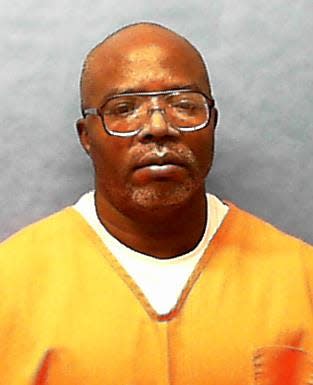Judge denies defense request for lethal injection records in 'ninja killer' case
- Oops!Something went wrong.Please try again later.

Attorneys for Louis Gaskin will not obtain records related to lethal injection and other information they had requested as they try to prevent the state from executing Gaskin, who has been called the "ninja killer."
Gov. Ron DeSantis signed a death warrant for Gaskin, who is scheduled to be executed on April 12 for the murders of Robert and Georgette Sturmfels on Dec. 20, 1989, in Palm Coast.
The death warrant set off a flurry of legal battles as Gaskin’s attorneys try to stop his execution by three-dose lethal injection protocol.
Attorney:Execution drug violates Gaskin's constitutional right against cruel punishment
'Ninja killer':Execution date set for Flagler's 'Ninja killer' for 1989 double-slaying
Flagler inmate could be executed:What's next now that DeSantis has signed death warrant for Flagler's 'ninja killer'
Circuit Judge Terence denied the request for the records from Tracy Henry, one of the attorneys representing Gaskin.
Henry had asked for records about who would administer the lethal injection, the type training they had received and the type of oversight that would be in place.
“All of this is relevant to our knowledge of whether or not people who are going to execute my client are trained and are not going to be inflicting pain on my client,” Henry said during a hearing Friday attended by all the participants via Zoom.
Henry said the Death Penalty Information Center noted a number of troubled executions nationwide last year. She also said the process of executing inmates is increasingly becoming more secretive. She said a state execution should be a transparent process.
According to its website, the Death Penalty Information Center stated “2022 could be called the year of the botched execution.” The website stated that 35% or “seven of the 20 execution attempts were visibly problematic.” The information center cited problems such as incompetent executioners, defective protocols and failure to follow protocols.
Eighteen people were executed in the United States in 2022, according to the center. None were executed in Florida.
But Gaskin would be Florida's second execution this year following Donald Dillbeck, who was put to death Feb. 23 on a case from Leon County. Prior to Dillbeck, Florida's last execution was Gary Bowles on Aug. 22, 2019, from a Duval County case.
Henry also requested autopsy records to see if prior inmates who had been executed had suffered pulmonary edemas which would have caused pain. Henry said Gaskin had contracted COVID and his attorneys planned to review medical records to see if any resulting lung damage might lead to pain during execution.
Besides records on lethal injection, Henry requested copies of any communication between DeSantis or his office and the victims’ families. She also requested records from the Office of Executive Clemency.
"Mr. Gaskin is entitled to know why him, why now," Henry said.
Perkins said that the Florida Supreme Court had recently upheld Florida's lethal injection protocol. It also ruled that inmates were not entitled to records such as who carries out the executions and their training.
Attorneys for DeSantis’ office, the Department of Corrections and the Office of Executive Clemency objected to providing the additional records. Attorneys said that Gaskin was not entitled to the clemency records he requested.
Perkins agreed and denied that request as well as requests for records from the medical examiner's office.
Another hearing on the case is scheduled for Monday.
This article originally appeared on The Daytona Beach News-Journal: Louis Gaskin capital punishment case: Judge denies request for records
